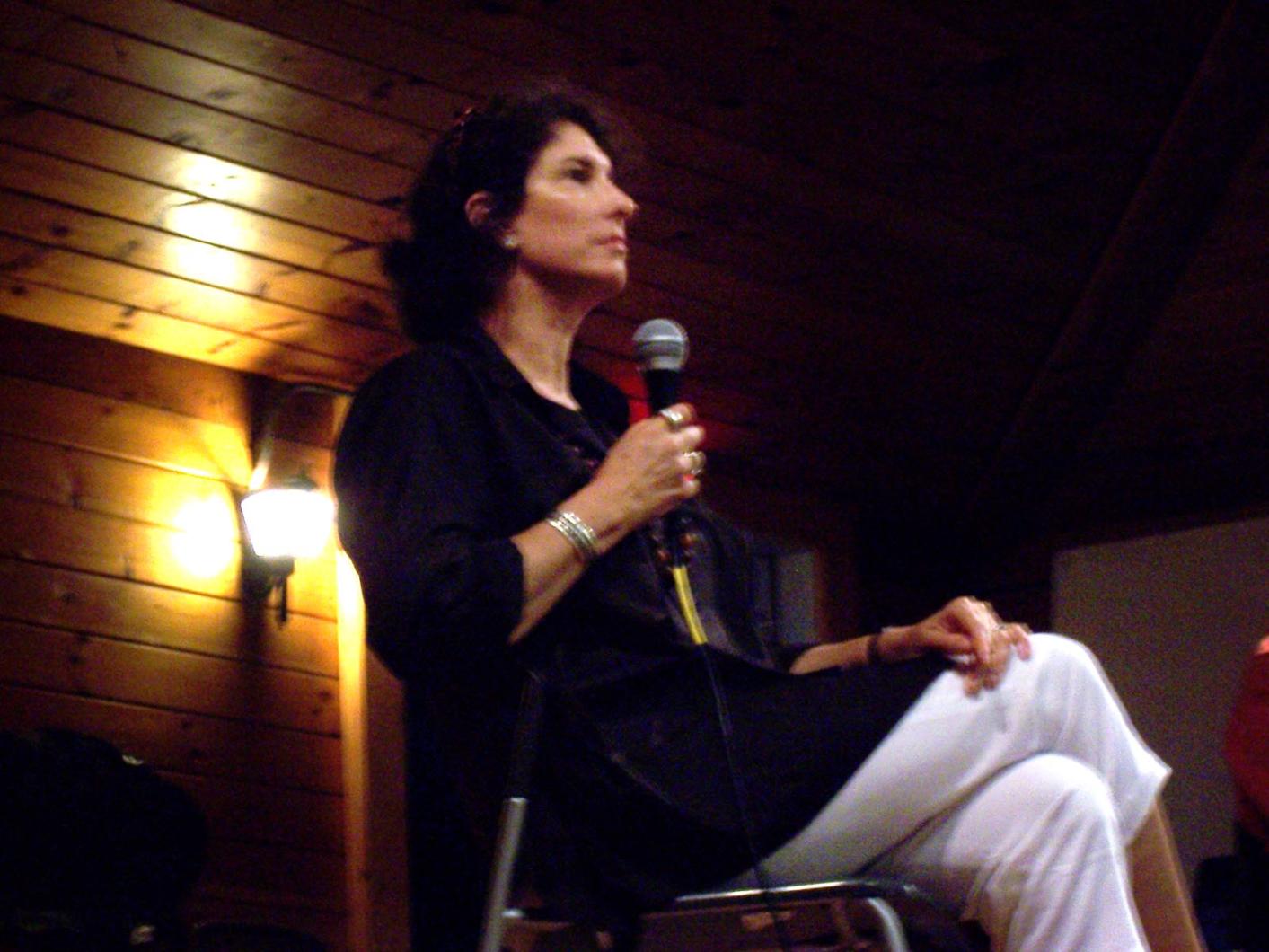It jumps out at you. In paragraph thirteen of an article written by Mara Liasson in July 1976, then a Vineyard Gazette intern: “Right now in the up-Island swamps the bushes are covered with heavy clusters of cream-colored flowers and purple berries.”
Of course, by the time an elderberry bush bears berries, its flowers tend to be long gone.
It was a grave error to be sure. But in a testament to perseverance, Ms. Liasson salvaged a career from the wreckage of this mistake and, addressing a packed Chilmark Community Center Sunday night, she was able to laugh it off.
No doubt she felt buffered by any one of the Merrion Smith awards she has since won for daily reporting, covering national elections for National Public Radio (NPR.)
Over the past two decades, Ms. Liasson has become one of the most authoritative voices on national politics in America. Today, as a national political correspondent for NPR and a regular pundit on the Sunday morning television news shows, she is covering her fifth, and favorite, national election.
“This is the best one ever. I don’t think we’ll live long enough to see another like it,” she told her audience, which extended into the hallway of the community center and included fellow media luminaries and academics.
It’s distinguished, she said, by having two “serious” candidates and also by the interest it has sparked in American culture.
“It’s turned out everyone into political junkies,” she said, telling the story of a friend informed by a two-year-old that Sen. Barack Obama “has more delegates.”
This election looks set to be remarkable for the youth vote it will attract. Further, there is no Vice President or other incumbent choice to effectively provide a third term for current President George Bush. Also, she said, the so-called red and blue states appear to be less gridlocked than in previous years.
The election also is unusual because this time the Democratic candidate is the more religious candidate.
Speaking of Republican candidate Sen. John McCain, she said, “McCain is more secular. He hates the social issues. He doesn’t go to church. Obama is the one pictured in front of church.”
It is the first You Tube election and the Internet has changed how the election is covered and consumed: “We wouldn’t have known about the Bill Clinton tirade,” she said, alluding to the scoops of Mayhill Fowler, the self-described citizen journalist who posed as both a Clinton fan and an Obama donor and got two influential stories.
“No journalist would have got that,” she said, “but you now have these bloggers who don’t identify themselves as journalists but have just as big a platform as the news anchors.”
The “nine-month knife fight” of the primary elections was surprising from a reporter’s point of view, she said, pointing to the eventual winner and runner-up in the Republican line-up: Senator McCain and Gov. Mike Huckabee.
“The winners were the funniest candidates, the ones with no money and the most iconoclastic,” she said, “McCain is on many levels anathema to his party.” She described Governor Huckabee as an “evangelical Trotskyite.”
Before taking questions, both on election coverage and journalism as a whole, Ms. Liasson posed some of her own: Was the 2006 election simply an interruption or was it the beginning of a seismic change, signaling the beginning of a progressive era in American politics? Can Senator McCain make this a “Commander-in-Chief election,” focusing on the Iraq war and terrorism? Will Senator Obama remain “a question mark” on whether he is a transformative or centrist candidate? And, in reference to the series of erroneous predictions by the media about the outcome of the primaries, “What else are we journos going to get wrong?”
Rick Shweder, a cultural anthropologist and a professor of psychology at the University of Chicago, asked Ms. Liasson to elaborate on an earlier observation that Senator Obama’s leadership style would benefit from a strong Democratic majority in the House and Senate. Senator Obama has frequently voiced his intention to work across party lines but, said Ms. Liasson: “You can’t just do it by style.”
She pointed out that while Senator McCain has been in the middle of such compromises in the past, Senator Obama does not have the same length of voting record to analyze.
Marybeth Norton, a women’s historian at Cornell University, asked about changing attitudes to women in journalism.
“There’s a heck of a lot more [women] than there used to be, particularly as journalism becomes lesser paid than it used to be,” she said. “It’s still white men in suits on television.”
Finlay Lewis, a veteran journalist who worked for the Washington Post, inquired about the future for accountability in journalism, given that major newspapers are making cuts to reporting teams while still demanding similar editorial results. Ms. Liasson said she considered herself fortunate that NPR — recently buoyed by a grant of more than $225 million in 2003 from Joan Kroc, widow of the founder of McDonald’s Corporation — has been able to remain an island of functioning journalism.
“But it’s really disturbing I can’t answer that question,” she said, “It’s a heartbreaking time to be in the newspaper business.”







Comments
Comment policy »